
Sadr City, formerly known as Al-Thawra and Saddam City, is a suburb district of the city of Baghdad, Iraq. It was built in 1959 by Prime Minister Abdul Karim Qassim and named Al-Rafidain District. After the US-led invasion of Iraq and the toppling of Saddam, it was unofficially renamed Sadr City after Ayatollah Muhammad al-Sadr.

The Islamic Dawa Party, is an Iraqi Shia Islamist political movement that was formed in 1957 by seminarians in Najaf, Iraq, and later formed branches in Lebanon and Kuwait. The Party backed the Iranian Revolution and also Ayatollah Ruhollah Khomeini during the Iran–Iraq War. It supported the invasion of Iraq. Iran played a crucial role in the development of the movement, especially its Lebanese branch which later became Hezbollah. In 2019, the Dawa Party was reportedly suffering from internal divisions and is in danger of losing its "political relevance". The Islamic Dawa Party is led by Nouri Al-Maliki.

Muqtada al-Sadr is an Iraqi Shia Muslim cleric, politician and militia leader. He inherited the leadership of the Sadrist Movement from his father. He founded the now dissolved Mahdi Army militia in 2003 that resisted the American occupation of Iraq. He also founded the Promised Day Brigade militia after the dissolution of the Mahdi Army; both were backed by Iran. In 2014, he founded the Peace Companies militia and is its current head. In 2018, he joined his Sadrist political party to the Saairun alliance, which won the highest number of seats in the 2018 and 2021 Iraqi parliamentary elections.

The Mahdi Army or Jaish Al-Imam Mahdi ' a'ajal allahu farajah ' or The Army of Imam Mahdi ' was an Iraqi Shia militia created by Muqtada al-Sadr in June 2003 and disbanded in 2008.

Muhammad Baqir al-Sadr, also known as al-Shahid al-Khamis, was an Iraqi Islamic scholar, philosopher, and the ideological founder of the Islamic Dawa Party, born in al-Kadhimiya, Iraq. He was father-in-law to Muqtada al-Sadr, a cousin of Muhammad Sadeq al-Sadr and Imam Musa as-Sadr. His father Haydar al-Sadr was a well-respected high-ranking Shi'a cleric. His lineage can be traced back to Muhammad through the seventh Shia Imam Musa al-Kazim. Muhammad Baqir al-Sadr was executed in 1980 by the regime of Saddam Hussein along with his sister, Amina Sadr bint al-Huda.

The Badr Organization, previously known as the Badr Brigades or Badr Corps, is an Iraqi Shia Islamist and Khomeinist political party and paramilitary organization headed by Hadi al-Amiri. The Badr Brigade, formed in 1982 and led by Iranian officers, served as the military arm of the Supreme Council for Islamic Revolution in Iraq (SCIRI), a Shia Islamic party based in Iran. The Badr Brigade was created by Iranian intelligence and Shia cleric Mohammad Baqir al-Hakim with the aim of fighting the Ba'athist regime of Saddam Hussein during the Iran–Iraq War. Since the 2003 US-led invasion of Iraq, most of the Badr Brigade fighters have entered the new Iraqi army and police force. Since 2003, the Badr Brigade and SCIRI were considered to be one party, but have recently unofficially separated with the Badr Organization now being an official Iraqi political party. Badr Brigade forces, and their Iranian commanders, have come to prominence in 2014 fighting the Islamic State of Iraq and the Levant (ISIL) in Iraq. It is a part of the Popular Mobilization Forces.

The Syrian Army, officially the Syrian Arab Army, was the land force branch of the Syrian Armed Forces. It was the dominant military service of the four uniformed services, controlling the most senior posts in the armed forces, and had the greatest manpower, approximately 80 percent of the combined services. The Syrian Army originated in local military forces formed by the French after World War I, after France obtained a mandate over the region. It officially came into being in 1945, before Syria obtained full independence the following year.
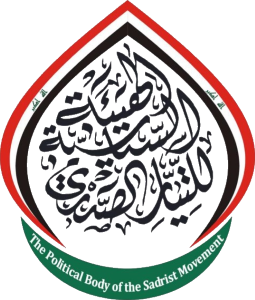
The Sadrist Movement is an Iraqi Shi'a Islamic national movement and political party, led by Muqtada al-Sadr.
Ismail Hafidh al-Lami — known as Abu Deraa is an Iraqi Shia militant whose men have been accused of retaliatory terrorizing and killing of Sunnis.
Special Groups (SGs) is a designation given by the United States military to the cell-based Shi'a paramilitary organizations operating within Iraq, According to the United States these groups are funded, trained, and armed by the Iranian Quds Force, part of the Islamic Revolutionary Guard Corps (IRGC). According to the United States Department of Defense, 603 American troops in total were confirmed to have been killed by IRGC-backed Shia militias during the Iraq War.

On 24 June 2009, a bombing occurred in the Muraidi Market of Sadr City in Baghdad, Iraq. At least 69 people were killed and 150 others injured. An official said that the explosion was caused by a bomb hidden underneath a motorised vegetable cart in the market, as reported by the BBC and CNN. As reported by The New York Times, the Iraqi Interior Ministry said that it was caused by a bomb attached to a motorcycle. Shrapnel from the bomb injured people 600 metres (660 yd) away from the explosion. Civilians tried to help the injured following the explosion, until security forces forced them back to allow emergency services to enter the market. The Iraqi Army, the Iraqi government, the American military and Iraqi political parties were held responsible for the bombing by the witnesses and relatives of the wounded. Politicians affiliated with Muqtada al-Sadr accused the 11th Brigade of the Iraqi Army, which is responsible for Sadr City, for the attack. These politicians also said that the American military was partly to blame, because they brought the 11th Brigade to the neighbourhood.
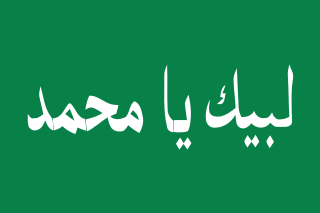
The Promised Day Brigade, originally called the Muqawimun, was a Shiite organization and insurgent group operating during the Iraq War and later the Syrian Civil War. In 2010, it was one of the largest and most powerful "Special Groups".

Asa'ib Ahl al-Haq, also known as the Khazali Network, is a radical Iraqi Shia Islamist political party and paramilitary organization previously active in the Iraqi insurgency and Syrian Civil War. During the Iraq War it was known as Iraq's largest "Special Group", and it is part of the Popular Mobilization Forces (PMF) in the 41st, 42nd, and 43rd Brigades, cooperating with the Iraqi government in its fight against ISIS.
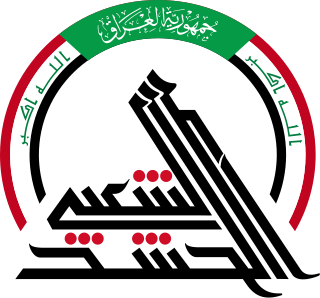
The Popular Mobilization Forces, also known as the Popular Mobilization Units (PMU) is a military formation of the Iraqi Armed Forces that reports directly to the Prime Minister. It is composed of about 67 primarily Shi’ie armed factions but which also include Sunni, Christian, and Yazidi groups. The PMF were formed in 2014 and fought in nearly every major battle during the War in Iraq (2013–17) against Islamic State. In December 2016, the Iraqi Council of Representatives passed a law that defined the PMF’s legal status and created the Popular Mobilization Commission, which is a formal governmental agency that includes all PMF groups.
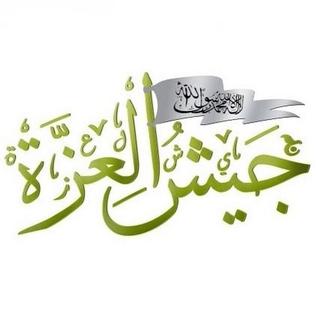
The Army of Glory, formerly the Union of Glory, is a Syrian rebel group affiliated with the Free Syrian Army active in northwestern Syria, mainly in the al-Ghab Plain in northern Hama and its surroundings. Turkey, Qatar, and Saudi Arabia have supplied the group with anti-tank missiles including 9K111 Fagots and BGM-71 TOWs.
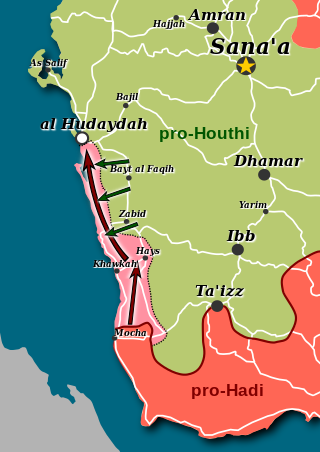
Al Hudaydah offensive, also called Western Coast Offensive, describes the offensive launched in December 2017 by pro-government forces against the Houthis in Al Hudaydah Governorate as part of Yemen's 2015 civil war. As of December 2018, the pro-government forces have captured the towns of Al Khawkhah, Hays, At Tuhayta, and brokered a ceasefire in Al Hudaydah City. In November 2021, a coalition withdrawal led the Houthi forces to break the siege of Al Hudaydah and recapture At Tuhayta.
Saraya al-Jihad is an Iraqi Shia group and the armed wing of the Jihad and Development Movement, operating in Iraq and formerly in Syria as the 17th Brigade of the Popular Mobilization Forces. It has been closely intertwined with Liwa al-Muntazar.
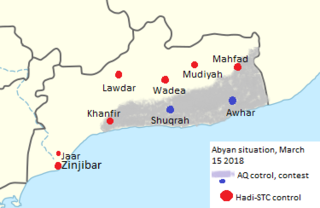
The Abyan conflict was a series of clashes between forces of AQAP loyal to Yemeni president Abdrabbuh Mansur Hadi, and forces loyal to Southern Movement for the control of Abyan between 2016 and 2018.

The Babylon Movement is a political party situated in Iraq. Founded in 2014, it is the political wing of the Babylon Brigades, a Christian militia that was formed as part of Iraq's Popular Mobilization Forces. Rayan al-Kildani currently leads the party since founding it in 2014.
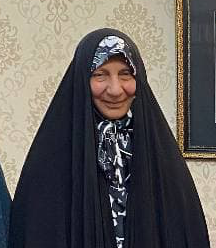
Rabab al-Sadr Charafeddine is a Lebanese activist and president of the Imam al-Sadr Foundation. She is the sister of disappeared Shia imam and political leader Musa al-Sadr.

















